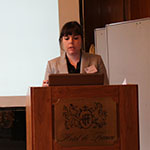Euroacademia Conferences
 Europe Inside-Out: Europe and Europeanness Exposed to Plural Observers (9th Edition) April 24 - 25, 2020
Europe Inside-Out: Europe and Europeanness Exposed to Plural Observers (9th Edition) April 24 - 25, 2020 Identities and Identifications: Politicized Uses of Collective Identities (9th Edition) June 12 - 13, 2020
Identities and Identifications: Politicized Uses of Collective Identities (9th Edition) June 12 - 13, 2020 8th Forum of Critical Studies: Asking Big Questions Again January 24 - 25, 2020
8th Forum of Critical Studies: Asking Big Questions Again January 24 - 25, 2020 Re-Inventing Eastern Europe (7th Edition) December 13 - 14, 2019
Re-Inventing Eastern Europe (7th Edition) December 13 - 14, 2019 The European Union and the Politicization of Europe (8th Edition) October 25 - 26, 2019
The European Union and the Politicization of Europe (8th Edition) October 25 - 26, 2019 Identities and Identifications: Politicized Uses of Collective Identities (8th Edition) June 28 - 29, 2019
Identities and Identifications: Politicized Uses of Collective Identities (8th Edition) June 28 - 29, 2019 The European Union and the Politicization of Europe (7th Edition) January 25 - 26, 2019
The European Union and the Politicization of Europe (7th Edition) January 25 - 26, 2019 7th Forum of Critical Studies: Asking Big Questions Again November 23 - 24, 2018
7th Forum of Critical Studies: Asking Big Questions Again November 23 - 24, 2018 Europe Inside-Out: Europe and Europeanness Exposed to Plural Observers (8th Edition) September 28 - 30, 2018
Europe Inside-Out: Europe and Europeanness Exposed to Plural Observers (8th Edition) September 28 - 30, 2018 Identities and Identifications: Politicized Uses of Collective Identities (7th Edition) June 14 - 15, 2018
Identities and Identifications: Politicized Uses of Collective Identities (7th Edition) June 14 - 15, 2018
Against Assimilatory Forgetting: Memory as Identity in Contemporary Fiction on Migration from Eastern Europe
-
-

-
Presentation speakers
- Giulia Da Lio, Stockholm University, Sweden
- Download presentation
Abstract:
According to Jan Assmann, the process of “transition from one group into another one” is “accompanied by an imperative to forget the memories with the original identity” (“Communicative and Cultural Memory”). However, if one assumes that the process of migration represents such a transition (both in social and cultural terms), it is possible to single out a different approach to memory within contemporary English writing on migration from Eastern Europe. In particular, in Marina Lewycka’s A Short History of Tractors in Ukrainian and Kapka Kassabova’s Reconnaissance, memory contributes to the construction of transcultural identities where any opposition based on the dichotomy East/West gradually loses its meaning.
I am going to investigate how the narrative strategies in both the novels revolve around memory as a trigger for a new definition of identity based on transition rather than on the identification with national groups. The main characters’ direct belonging to a group is questioned by the emergence of family memories connected to migration from Ukraine (in Tractors) and from Bulgaria (in Reconnaissance). The narrative of memories breaks the main action in the novel and the plot can develop towards an end just when the characters have acknowledged memories of migration and of Eastern Europe as part of their own identity. Memory, as in Assmann, is a form of “realisation of belonging” but without that “assimilatory forgetting” that he sees as part of the transition among groups.
Lewycka and Kassabova represent characters in need of revising the history of their native lands through the filter of their family memory, opposing in this way the power of stories to the strength of official narratives. “To tell someone” is the condition for being “free[d] of the burden of history” (Kassabova), the only possibility to cast new light on what has remained untold or biased within narratives dealing with Eastern Europe after the Cold War. All in all, Lewycka’s and Kassabova’s fiction on migration challenges discourses on Eastern Europe, while at the same time bestowing new interpretative options on both Eastern European history and migration from countries which have experienced Soviet domination.
-
Related Presentations

East - West Reflections On the Shared Values
- Liliya Sazonova
















